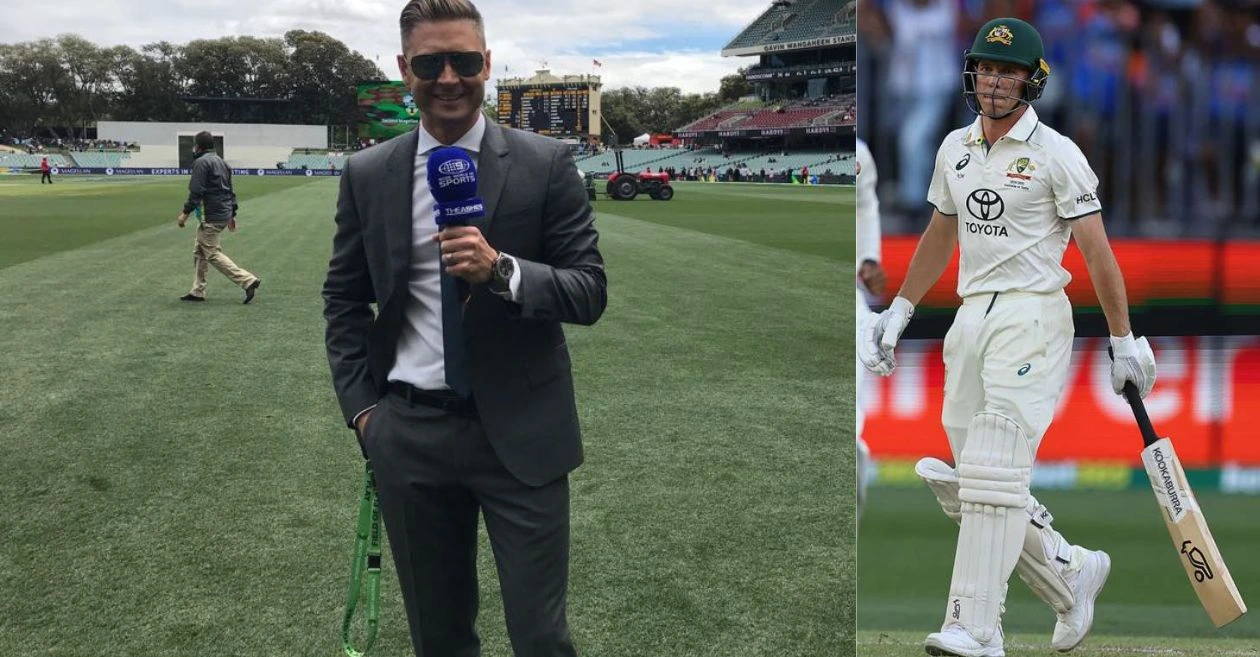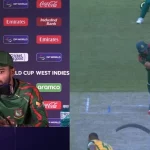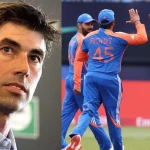The Border-Gavaskar Trophy has long been a stage for fiery contests between India and Australia, but the spotlight has shifted off the field recently due to Australian cricket legend Michael Clarke’s outspoken criticism of the selectors. The former Australian captain didn’t hold back after Nathan McSweeney, Australia’s opening batter, was dropped for the final two Tests of the ongoing series. Clarke’s remarks, shared on the Beyond 23 Cricket podcast, have sparked debate, with fellow stalwart Darren Lehmann echoing his sentiments.
As the series heads to its decisive fourth Test at the Melbourne Cricket Ground (MCG), Clarke’s critique not only underscores concerns about team selection but also raises questions about the broader planning and direction of Australian cricket.
Michael Clarke Slams Selectors for Dropping Nathan McSweeney
Nathan McSweeney, despite a string of underwhelming performances in the first three Tests, was expected by many to retain his spot for the entirety of the Border-Gavaskar Trophy. Clarke strongly believes the selectors erred in axing the 24-year-old opener mid-series, and he didn’t mince words in voicing his disappointment.
“Nathan McSweeney has been dropped. I can’t believe that,” Clarke said on the podcast. “No matter who they picked in that opening position, they had to give them the series. I think the selectors have got this wrong.”
For Clarke, the decision to bring in 19-year-old opener Sam Konstas for the remaining Tests sends the wrong message. He argued that the lack of patience shown towards McSweeney could have long-term consequences for the young player’s confidence and career trajectory.
This isn’t the first time Clarke has openly criticized team management and selectors. Known for his candid opinions, the former captain has consistently called for accountability in selection policies, particularly when they seem reactionary rather than strategic.
Backing From Darren Lehmann
Clarke’s views found support from former Australian cricketer Darren Lehmann, who has also questioned the decision-making of chief selector George Bailey. Lehmann, who previously served as Australia’s head coach, suggested that McSweeney’s exclusion mid-series reflects poorly on the selectors’ ability to stick with their choices during challenging times.
“Selectors need to back their players, especially young ones like McSweeney,” Lehmann said in a recent interview. “Dropping him now only adds unnecessary pressure.”
The sentiment shared by Clarke and Lehmann is a call for consistency—a critical factor in nurturing talent in international cricket.
Clarke Questions the Role of Senior Players
Clarke didn’t stop at criticizing McSweeney’s omission. He further scrutinized the presence of some senior players in the Australian squad who, in his opinion, are either struggling with form or nearing the end of their careers.
“We’ve got Usman Khawaja who is 38 years old, and he’s made no runs. He’s a senior player,” Clarke stated. “We’ve got Marnus Labuschagne, who before the series was under pressure and has made one decent score. Steve Smith batted like a genius to make a hard-fought hundred, but he’s also been under pressure.”
Clarke’s concerns point to a lack of foresight in the selectors’ approach. With several players in their mid-to-late 30s, including Khawaja, Clarke questioned the planning for a future where these senior players may no longer be available.
“What happens if Usman Khawaja retires in two Test matches? Does McSweeney then come back in, or does he go to the back of the queue?” he asked, highlighting the absence of a clear succession plan.
For Clarke, it isn’t just about McSweeney—it’s about a larger issue of preparedness. He argued that selectors need to admit when they’ve made mistakes and prioritize consistency to develop younger players for the long term.
Australia’s Dilemma at 1-1
The Border-Gavaskar Trophy has been a closely fought series so far, with both teams showcasing their dominance in different phases. India claimed victory in the opening Test at Perth, but Australia bounced back strongly in Adelaide. The third Test in Brisbane ended in a gripping draw, leaving the series poised at 1-1 ahead of the decisive fourth match at the MCG.
While Australia will hope the inclusion of Sam Konstas breathes fresh energy into their batting lineup, the decision to drop McSweeney has undoubtedly raised eyebrows. Clarke and Lehmann’s criticisms reflect concerns not just about individual decisions but about the broader direction of Australian cricket.
The Case for Nathan McSweeney
Despite his poor run in the first three Tests, McSweeney is widely regarded as one of Australia’s brightest young talents. His domestic performances leading up to the series had earned him a spot in the squad, and many believed he deserved a longer rope to prove his worth on the international stage.
Dropping a player mid-series can often have psychological consequences, affecting confidence and development. By replacing McSweeney with Konstas, the selectors risk sending a message that short-term results outweigh long-term investment in young talent.
Sam Konstas: A New Hope or Added Pressure?
At just 19 years old, Sam Konstas represents a bold gamble for the Australian selectors. The teenager has impressed in domestic cricket with his fearless approach and technical soundness, but the pressure of debuting in a high-stakes series against a formidable Indian side could prove daunting.
If Konstas succeeds, the selectors will feel vindicated. However, if he struggles, questions about their decision to drop McSweeney will only grow louder.
Clarke’s Broader Concerns About Selection Policies
Clarke’s critique of Australian cricket isn’t limited to individual decisions. He has often raised concerns about the lack of transparency and accountability in selection processes. For him, dropping McSweeney mid-series is symptomatic of a larger issue—reactive decision-making that prioritizes immediate results over long-term stability.
“Selectors need to come out and say, ‘We made a mistake picking him,’” Clarke argued, calling for more openness and responsibility from those making decisions.
What Lies Ahead?
As Australia prepares for the fourth Test, the focus will inevitably shift back to on-field performances. However, the debate sparked by Clarke’s comments serves as a reminder of the importance of consistent selection policies and future planning.
Whether or not Sam Konstas rises to the occasion, the decision to drop Nathan McSweeney will remain a talking point, not just for this series but for Australian cricket’s approach to nurturing young talent.
For Michael Clarke, the message is clear: success in international cricket requires patience, planning, and a commitment to backing players through thick and thin. As the Border-Gavaskar Trophy reaches its climax, the Australian selectors will hope their decisions yield the desired results—but the questions raised by Clarke and others will likely linger long after the series is over.
Please check for information on the best betting sites in India – https://selectory.org/best-betting-sites/















